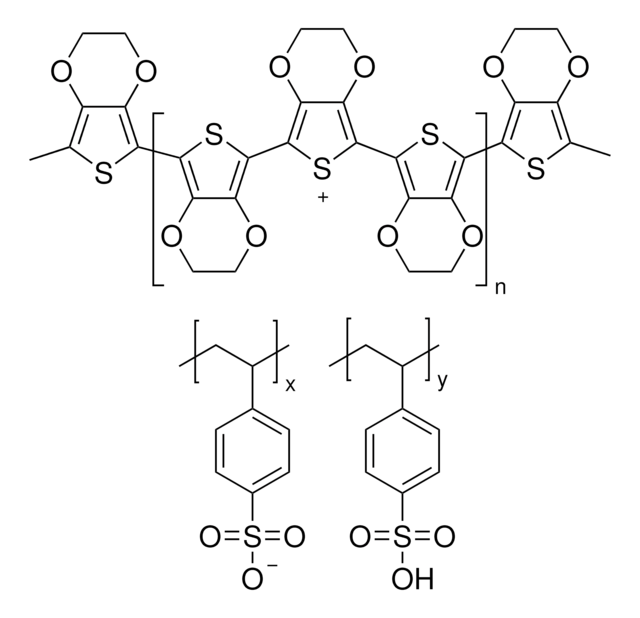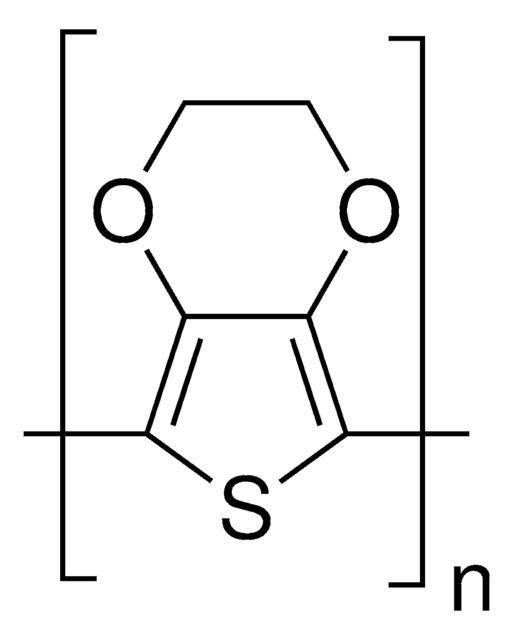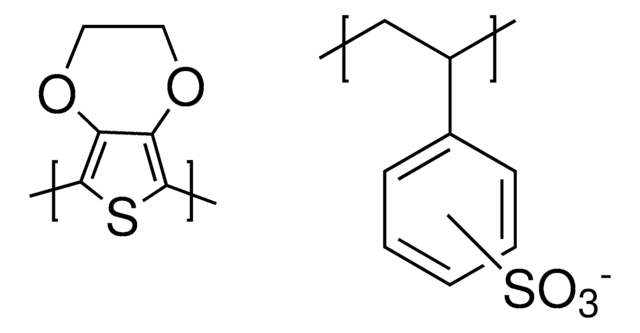655201
Poly(3,4-ethylenedioxythiophene)-poly(styrenesulfonate)
3.0-4.0% in H2O, high-conductivity grade
Synonyme(s) :
PEDOT:PSS, Poly(2,3-dihydrothieno-1,4-dioxin)-poly(styrenesulfonate)
About This Item
Produits recommandés
Qualité
high-conductivity grade
Niveau de qualité
Caractéristiques du produit alternatif plus écologique
Design for Energy Efficiency
Learn more about the Principles of Green Chemistry.
Concentration
3.0-4.0% in H2O
Résistance
1500 Ω/sq, 4 point probe measurement of dried coating based on initial 6μm wet thickness.
500 Ω/sq, 4 point probe measurement of dried coating based on initial 18μm wet thickness.
pH
1.5-2.5 (25 °C, dried coatings)
Conductivité
>200 S/cm
Viscosité
10-30 cP(20 °C)
Densité
1.011 g/cm3 (dried coatings)
Autre catégorie plus écologique
Température de stockage
2-8°C
Vous recherchez des produits similaires ? Visite Guide de comparaison des produits
Catégories apparentées
Description générale
Application
Conditionnement
Mention d'avertissement
Danger
Mentions de danger
Classification des risques
Eye Dam. 1 - Skin Corr. 1
Code de la classe de stockage
8B - Non-combustible, corrosive hazardous materials
Classe de danger pour l'eau (WGK)
WGK 3
Point d'éclair (°F)
Not applicable
Point d'éclair (°C)
Not applicable
Équipement de protection individuelle
Faceshields, Gloves, Goggles, type ABEK (EN14387) respirator filter
Certificats d'analyse (COA)
Recherchez un Certificats d'analyse (COA) en saisissant le numéro de lot du produit. Les numéros de lot figurent sur l'étiquette du produit après les mots "Lot" ou "Batch".
Déjà en possession de ce produit ?
Retrouvez la documentation relative aux produits que vous avez récemment achetés dans la Bibliothèque de documents.
Articles
In the emerging field of organic printable electronics, such as OLEDs and organic photovoltaics (OPVs), there is a significant need for improved organic conducting and semiconducting materials. This paper reports our recent progress in two fields: 1) the development of solvent-based dispersions of the intrinsically conducting polymer (ICP) poly(3,4- ethylenedioxythiophene) (PEDOT) and 2) the synthesis of new electron-deficient (n-type) semiconducting polymers.
Conducting polymers such as polyaniline, polythiophene and polyfluorenes are now much in the spotlight for their applications in organic electronics and optoelectronics.
Find advantages of inorganic interface layer inks for organic electronic & other applications.
Progress in Organic Thermoelectric Materials & Devices including high ZT values of >0.2 at room temperature by p-type (PEDOT:PSS) & n-type (Poly[Kx(Ni-ett)]) materials are discussed.
Notre équipe de scientifiques dispose d'une expérience dans tous les secteurs de la recherche, notamment en sciences de la vie, science des matériaux, synthèse chimique, chromatographie, analyse et dans de nombreux autres domaines..
Contacter notre Service technique


